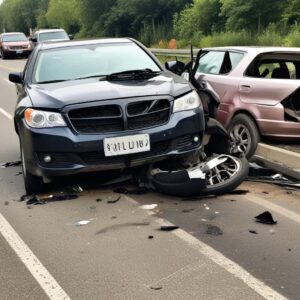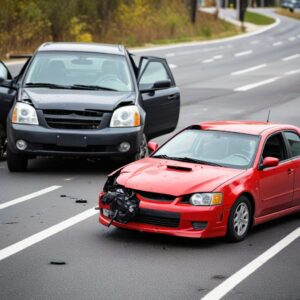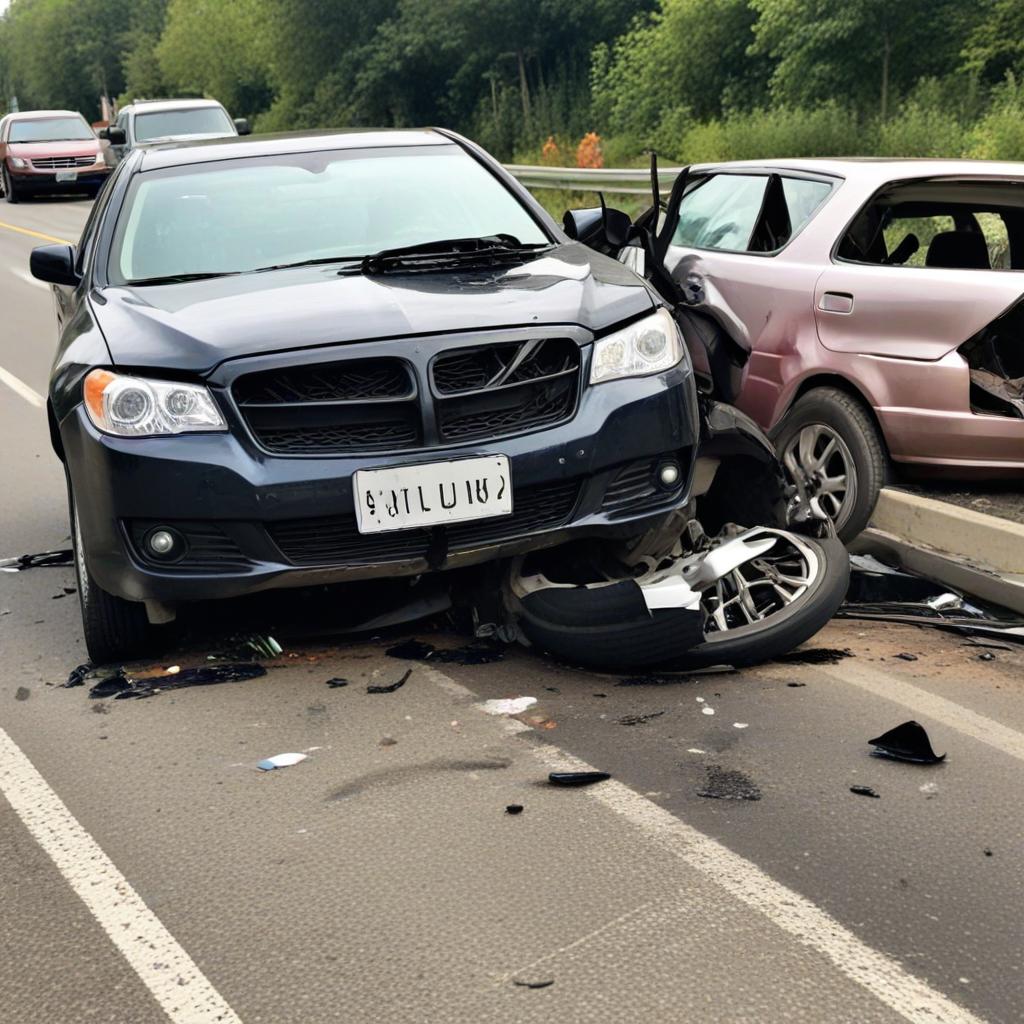Understanding Car Accidents: Causes, Consequences, and Prevention
Introduction
Car accidents are a leading cause of injury and death worldwide. Every year, millions of people are affected by car crashes, which can have devastating consequences both physically and financially. Understanding the causes of car accidents, their impact on individuals and society, and the steps that can be taken to prevent them is crucial for anyone who drives or shares the road. This article will delve into the various aspects of car accidents, providing insight into their causes, consequences, and prevention strategies.

Causes of Car Accidents
Car accidents occur for various reasons, and understanding these causes can help in reducing their frequency. The most common causes of car accidents include:
1. Distracted Driving:
– Distracted driving is one of the leading causes of car accidents. It includes any activity that diverts attention from driving, such as talking or texting on your phone, eating and drinking, talking to people in your vehicle, or fiddling with the stereo, entertainment, or navigation system. Texting while driving is particularly dangerous as it involves all three types of distraction: visual, manual, and cognitive.
2. Speeding:
– Speeding significantly increases the likelihood of a car accident. The faster a vehicle travels, the less time a driver has to react to a potential hazard and the more severe the impact of a crash. Speeding reduces a driver’s ability to steer safely around curves or objects in the roadway, extends the distance necessary to stop a vehicle, and increases the distance a vehicle travels while the driver reacts to a dangerous situation.
3. Driving Under the Influence (DUI):
– Driving under the influence of alcohol or drugs is a major cause of car accidents. Alcohol impairs the driver’s ability to operate the vehicle safely by reducing reaction time, impairing judgment, and lowering concentration. Drug use, including prescription drugs and illicit substances, can also affect a driver’s ability to function normally behind the wheel.
4. Reckless Driving:
– Reckless driving involves operating a vehicle with willful disregard for the safety of persons or property. It includes behaviors like aggressive driving, tailgating, changing lanes without signaling, and running red lights. Reckless drivers often underestimate the risks involved in their actions, leading to dangerous situations.
5. Weather Conditions:
– Adverse weather conditions, such as rain, snow, fog, and ice, can make driving more dangerous. Wet or icy roads reduce tire traction, making it harder to control the vehicle. Visibility can also be reduced, increasing the likelihood of a collision.
6. Running Red Lights and Stop Signs:
– Ignoring traffic signals and stop signs is a common cause of car accidents. Drivers who run red lights or fail to stop at stop signs often collide with vehicles that have the right of way, leading to high-impact crashes.
7. Fatigue:
– Driving while tired or drowsy can be just as dangerous as driving under the influence. Fatigue slows reaction times, impairs judgment, and increases the likelihood of falling asleep at the wheel. Long hours behind the wheel, shift work, and untreated sleep disorders are common contributors to driver fatigue.
8. Vehicle Defects:
– Sometimes, car accidents are caused by mechanical failures or defects in the vehicle itself. These can include brake failures, tire blowouts, and steering malfunctions. Regular vehicle maintenance and prompt attention to recall notices can help prevent accidents caused by mechanical issues.
Consequences of Car Accidents

The consequences of car accidents can be far-reaching, affecting individuals, families, and society as a whole. The most significant impacts include:
1. Physical Injuries:
– Injuries from car accidents can range from minor cuts and bruises to severe, life-altering conditions such as traumatic brain injuries, spinal cord injuries, and amputations. Some injuries may require long-term medical care, and rehabilitation, and can result in permanent disability.
2. Emotional and Psychological Impact:
– Beyond physical injuries, car accidents can have a profound emotional and psychological impact. Victims may experience post-traumatic stress disorder (PTSD), anxiety, depression, and a fear of driving. These psychological effects can affect the victim’s quality of life and may require therapy or counseling.
3. Financial Consequences:
– Car accidents can lead to significant financial burdens. Medical bills, vehicle repairs, and lost wages due to time off work can add up quickly. In severe cases, victims may be unable to return to work, leading to long-term financial instability. Additionally, car accidents can result in higher insurance premiums and potential legal fees.
4. Legal Consequences:
– Depending on the circumstances of the accident, legal consequences may follow. If a driver is found to be at fault, they may face fines, license suspension, or even imprisonment in cases involving reckless driving or DUI. Civil lawsuits can also arise, where victims seek compensation for damages from the at-fault driver.
5. Societal Impact:
– On a broader scale, car accidents have a significant societal impact. The costs associated with accidents, including medical care, legal fees, lost productivity, and property damage, run into billions of dollars annually. Additionally, car accidents contribute to congestion, emergency response burdens, and the emotional toll on communities.
Prevention Strategies

Preventing car accidents requires a combination of individual responsibility, public awareness, and regulatory measures. Here are some effective strategies to reduce the risk of car accidents:
1. Avoid Distracted Driving:
– To prevent distracted driving, focus solely on the task of driving. Put your phone away, set your GPS before you start driving, and avoid eating or drinking while on the road. Educating drivers about the dangers of distracted driving is also crucial.
2. Obey Speed Limits:
– Adhering to posted speed limits and adjusting your speed according to road conditions is essential. Driving at a safe speed gives you more time to react to unexpected situations and reduces the severity of a crash if one occurs.
3. Never Drive Under the Influence:
– The simplest way to avoid DUI-related accidents is never to drink and drive. Plan by designating a sober driver, using public transportation, or arranging for a ride-share service. Similarly, avoid driving if you are under the influence of drugs that impair your ability to drive safely.
4. Practice Defensive Driving:
– Defensive driving involves being aware of other drivers and anticipating potential hazards. Keep a safe distance from other vehicles, avoid aggressive driving, and always be prepared for the unexpected.
5. Stay Alert and Well-Rested:
– Ensure you are well-rested before getting behind the wheel. If you feel drowsy while driving, pull over to a safe location and take a break. Avoid driving during times when you would typically be sleeping, and try to stick to a regular sleep schedule.
6. Maintain Your Vehicle:
– Regular vehicle maintenance is key to preventing accidents caused by mechanical failures. Ensure your brakes, tires, lights, and steering are in good working order. Address any recall notices promptly.
7. Adhere to Traffic Laws:
– Always obey traffic signals, signs, and road markings. Stop completely at stop signs and red lights, and yield the right of way when required. Adhering to traffic laws is a fundamental part of safe driving.
8. Educate and Raise Awareness:
– Public awareness campaigns and driver education programs can play a significant role in preventing car accidents. Teaching new drivers the importance of road safety and continuing education for experienced drivers can help reinforce safe driving habits.
Conclusion
Car accidents are a serious issue that affects millions of people every year. Understanding the common causes and consequences of car accidents is the first step in reducing their occurrence. By adopting safe driving practices, staying informed about the risks, and maintaining your vehicle, you can contribute to making the roads safer for everyone. Preventing car accidents requires a collective effort from drivers, policymakers, and the community, but the benefits—reduced injuries, lower costs, and saved lives—are well worth it.
NOTE:
This article provides a comprehensive overview of car accidents, covering causes, consequences, and preventive strategies to promote safer driving habits and reduce accidents.





